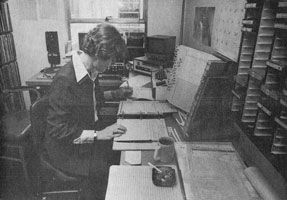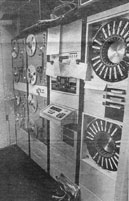Robot Radio for WDJF: Radio Without Disc Jockeys
The changes of Summer 1978 failed to be successful in both ratings and earnings potential. September 1979 would see 108 FM abandoning its unique alternative rock programming in favor of a syndicated music service. Many fans of WDJF's eclectic music offerings protested as their familiar music was replaced with the contemporary music based "Z" Format, an automated syndicated music service supplied by Century 21 Programming (presently known as TM Studios) located in Dallas, Texas.

The RP1000 automation system now allowed the station to air programming with minimal labor being expended to the operation of the FM station. Both Rod Ross and Doug McLennan were fired in cost-cutting measures as a direct result of the change. It was clear the station was desperate for programming that would attract greater listener numbers as well as advertising revenue since an Arbitron rating was non-existent for the previous alternative rock format.
A year later WDJF would finally show up in the ratings with a .3 percent share of the greater Bridgeport audience, Monday through Sunday, 6am to midnight, with people 12 years of age and older. Advertising increased 142 percent from the previous year as a direct result of the change in format.

WDJF eventually started to integrate live announcers back into its on-air presentation while using the automation system in a "live assist" mode, meaning the announcers would manually control the music from the automation system and perform live announcing.
In early 1983, WDJF would switch from the Century 21 "Z Format" to using the "American Rock" format produced by broadcast program syndicator Radio Arts Incorporated of Burbank, California.

Shirley Doak, who had been the station's traffic manager, later worked the overnight on-air shift. She often performed production duties during the first hour of her air shift and the automation reels played during this time would often feature the Radio Arts' staff announcer.
Pictured top left is a vintage WDJF bumper sticker with the butterfly logo. Upper right is the actual Century 21 Z Format programming and operations manual belonging to the station. Above left is Shirley Doak as she reconciles programming changes and updates for the RP1000 automation system, circa 1979. Lastly, on the right the SonoMag RP1000 broadcast automation system installed at WDJF. This systems utilized four Scully reel tape players, two carousel cartridge tape players and an ITC triple deck cartridge player.
